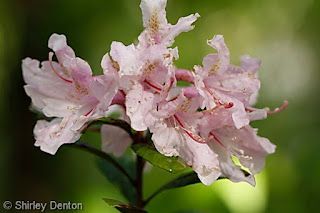FNPS Plant Database
Rhododendron minus var. chapmanii
Nomenclature
Common Name:
Synonym(s):
Genus species:
Family:
Ericaceae
Plant Specifics
Form:
Size:
Life Span:
Long-lived perennial
Flower Color:
Fruit Color:
Phenology:
Noted For:
Landscaping
Recommended Uses:
Considerations:
Availability:
Propagation:
Light:
Moisture Tolerance:
Always Flooded---------------------------------Extremely Dry
□□□□□□□□□□□□□□□□□□□□□□□□■■■■■■■■■□□□□□□□□□
Not wet but not extremely dry -to- Short very dry periods
Salt Water Flooding Tolerance:
Unknown
Salt Spray/Salty Soil Tolerance:
Low/no tolerance of salty wind or direct salt spray
Soil or Other Substrate:
Sand, Loam
Soil pH:
Suitable to Grow In:
8A,8B,9A,9B

USDA zones are based on the average annual extreme minimum winter temperature.
Don't know your zone? Click here to search by zip code.
Vouchered In:
Ecology
Wildlife:
Attracts insects. Apparently important to bumble bees.
Attracts pollinators, including hummingbirds.
Native Habitats:
Comments:
Ethnobotany:
General Comments:
Citations:
Encyclopedia.com. (Undated). Rhododendron, Chapman's. ( https://www.encyclopedia.com/environment/applied-and-social-sciences-magazines/rhododendron-chapmans ). Accessed 2026.
Chafin, L. G. (2000). Field Guide to the Rare Plants of Florida. Florida Natural Areas Inventory, Tallahassee, FL.
Wunderlin, R. P, B. F. Hansen, A. R. Franck, and F. B. Essig. (1999+). Atlas of Florida Plants. ( https://florida.plantatlas.usf.edu/ ). [S. M. Landry and K. N. Campbell (application development), USF Water Institute.] Institute for Systematic Botany, University of South Florida, Tampa, FL.









